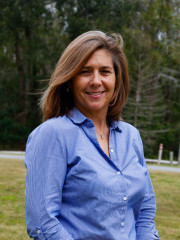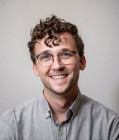You recently wrote an op-ed for the Orlando Sentinel on the banning of these events that you were organizing on your campus. What inspired you to write that piece and to speak out?
Well, I was angry. The last few years living in Florida and being in higher education has been very difficult with all of the bills that have been going through that are just attacking professors, attacking students, attacking classes and academic freedom. This was kind of the last straw for me.
I had gotten an endowed chair before and it was focused on this Banned Books and First Amendment event and it was no problem. We had people from the community, we had guest speakers, we gave out over a hundred banned books. It was a great event, students were very excited about it, everyone was excited about it, including, I thought, the administrators. So we reapplied again and when we reapplied for 2023-24, we got called up by an administrator.
At first they asked if we can change the name, and I knew at that point some things had happened in the legislature. We had the Stop WOKE bill, or HB7, and then this new bill SB266 was coming along. So I knew that I might have to do some things differently in order to keep the event, so I agreed to change the name. Then they asked me not to advertise it locally, I could only advertise it within the college. I agreed. And then they wanted an administrator to help me get the speakers and that’s when I put my foot down and said no.
So we decided to shift gears and thought maybe what we can do instead is have PEN America come. We worked with them all fall, came up with this great two day student summit on all kinds of freedoms, but when we got to the contract signing phase, the administration ended up cancelling that event. They said it was a technicality, but we all knew what was going on.
They said, you can come back with a different proposal. So we proposed an event during National Library Week with Lauren Groff, an author that lives in Florida, and some other speakers. We presented that again, and the administration said no and the reason was because they could no longer control what outside speakers would say.
So in the end, the whole project was canceled, even though this was all funded from private donations. The message we essentially received is that we just cannot do these things without potential consequences to the college. Suddenly, I was a living example of academic freedom suppression, ironically with a project that is about the First Amendment.
Speaking more generally, how are you seeing these kinds of laws impacting colleges, universities in Florida?
Well it's a lot of suppression. This started with us a few years ago when a bill passed. It snuck through there and suddenly we had a meeting at the beginning of the school year and were told, “By the way, you're now allowed to be recorded without your consent by any student, while in your class.” Although I've never experienced that, my students want to learn, they're not there to come in and tattle, but that kind of started everything. Now with all of these other bills that keep getting passed, it limits students' abilities to see different perspectives.
I know that we've had cancellations of our humanity speaker series. We used to have a psychology speaker series, we don't have that anymore. We're changing names of topics because we don't want to get eyes on us. We used to have pretty open communication through our employee newsletters and comments, you can't do that anymore. So there's a lot of suppression happening that is affecting faculty and it trickles down to students, but students are also getting targeted on their own for different things, like a bill that passed recently saying we can no longer have gender neutral bathrooms. At the same time, some of our student clubs are folding because they don’t know how they’re allowed to spend funds anymore. So it's really affecting everyone.
As somebody who's been teaching in Florida for a long time, what do you think these bills mean for higher education in your state and where do you see this all going?
Sadly, for myself, I have two kids in college right now in Florida. One's about to graduate, so it's okay for her, but my son is at a state school and it really does make me nervous that he is not going to have opportunities for critical thinking or that he will be attending classes where things are so controlled by the state that you get state-mandated perspectives about things. College is supposed to be about exploring a little bit and learning and figuring out what you like and what you may want to do. While you can still do that, there is a really constrained environment right now.
I don't know what's going happen, it's hard to predict, because honestly it’s been a real change over the last few years. Now there’s a new bill I've been watching, HB1, which is the social media for minors bill, that would be really problematic for my program. Under this bill, anybody under the age of 16 would no longer be allowed to have social media platforms in the state of Florida. I teach dual enrollment students and one of the classes I teach is called Writing for Social Media. How are those students going to be able to participate in my class or even our degree program if they cannot have social media platforms? So I don't know where this ends. I think they're trying to reign it back in a little, but that’s just my hope.
Based on your personal experiences dealing with this over the last few years, do you have any advice for scholars across the country who are experiencing similar environments?
Yes, I absolutely do. Florida is often a guinea pig state, as is Texas. By guinea pig I mean that they test things out in Florida that they clearly are going to try to do in other states. I know that in Indiana’s state legislative session right now, they are considering some of the DEI stuff that we just went through. That was SB266 for us. There's no more money to be used on anything DEI related, even though sometimes we don't even know what that means, but that's the law.
So my advice to faculty in other states would be, if you're sitting there and you're thinking, this cannot happen to you, it can absolutely happen to you and you need to be awake and you need to be paying attention to these issues because we were kind of asleep in Florida a little bit. The pandemic happened and we were all so busy with all of these other things that were going on that we realized that this was happening, and by the time we did, it was almost too late for us to do anything.
So stay awake. Know what's going on with your legislative leaders, what they're thinking of doing, and start writing them, calling them, talking to them, pushing back against these bills now because it's coming for you too.
Is there anything you see in the future for your own engagement on these topics, any ways that you're hoping to continue to speak out?
I have been involved in many different things in the state of Florida since about 2017, after the Parkland shooting down in south Florida, and I'm going to continue to do that because Florida is worth saving. I've lived here for a long, long time now. My children were born here. This is my home. It’s not like this all the time and we can save it. There are really good people here. So I will be continuing to speak out, and what I've noticed is there's more and more people speaking out about things. To me, that's a good sign that people really have had it with a lot of what's going on now. It's going take us time to roll things back, but we will.
New Member Spotlight: Rebecca Newman Speaks Out About Academic Suppression in Florida
As a longtime Florida resident, Professor Rebecca Newman has witnessed the political winds change in the Sunshine State. Over the last few years, that has meant a particular focus from state political leaders on the education system, and recently higher education. From HB7, which limits how issues related to race and discrimination can be taught, to the more recent SB266, which prohibits colleges and universities from spending money on “DEI” programs, academic freedom in Florida is under threat. Writing for The Orlando Sentinel, Professor Newman shared her own experience with academic suppression in an op-ed published in February. Below is a conversation with Professor Newman on what led her to write this piece and her thoughts and reflections on academic suppression in her home state. The conversation has been edited for length and clarity.
Q&A with Rebecca Newman

Newman is a media professor at Valencia College in Orlando, Florida. Newman's interest is in journalism, media literacy, media ethics and freedom of the press. Newman received Endowed Chairs for the "Banned Books Week and First Amendment Day Projects". Additionally, Newman is focusing on the emerging uses and best practices of AI in media. She currently serves on the Equity Committee for Seminole County Public Schools.
